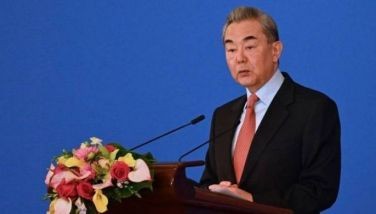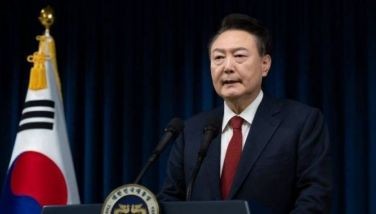Kerry: Mideast peace still possible despite rifts
JERUSALEM — Israeli Prime Minister Benjamin Netanyahu blasted his Palestinian partner in peace-making efforts on yesterday, accusing him of embracing terrorists "as heroes," harsh words that clouded the start of Secretary of State John Kerry's tenth trip to the region to negotiate a peace deal he claims is "not mission impossible."
Kerry arrived in Israel to broker negotiations that are entering a difficult phase aimed at creating a Palestinian state alongside Israel. He had dinner with Netanyahu and planned to be in the West Bank on Friday to talk with Palestinian President Mahmoud Abbas. Kerry is asking both leaders to make tough, highly charged political decisions in hopes of narrowing differences on a framework that will outline a final peace pact.
Netanyahu greeted Kerry at the prime minister's office and joked that it had been a long time since he'd seen him. But after the initial small talk, the Israeli leader took aim at Abbas. He claimed Abbas' homecoming for Palestinian prisoners released from Israeli jails earlier this week had led more Israelis to wonder if the Palestinians seriously want to find a way to end the decades-long dispute.
"I know that you're committed to peace," Netanyahu told Kerry. "I know that I'm committed to peace, but unfortunately, given the actions and words of Palestinian leaders, there's growing doubt in Israel that the Palestinians are committed to peace."
Netanyahu was referring to events surrounding Israel's release on Tuesday of more than two dozen Palestinian prisoners convicted in deadly attacks against Israelis. Netanyahu has faced political pressure from Israeli hard-liners for agreeing to release a total of 104 Palestinian prisoners as part of the US-brokered package to restart the peace talks.
As with earlier releases, the Palestinian prisoners received a hero's welcome upon their return to the West Bank and Gaza, with officials and jubilant relatives lining up to greet them. At his headquarters in Ramallah, Abbas waited to meet the men in the middle of the night, and he pledged not to sign any peace deal until all prisoners were released.
While he gave them a hero's welcome, Abbas, a long-standing critic of violence who has pledged his commitment to a two-state solution, did not condone the prisoners' deeds.
Netanyahu, however, accused Abbas of embracing terrorists "as heroes."
"To glorify the murders of innocent women and men as heroes is an outrage. ... How can he say that he stands against terrorism when he embraces the perpetrators of terrorism and glorifies them as heroes?" Netanyahu asked.
"I'm wondering what a young Palestinian would think when he sees the leader of the Palestinian people embrace people who axed innocent men and women — axed their heads or blew them up or riddled them with bullets. What's a young Palestinian supposed to think about the future?"
"This is not the way to achieve peace," Netanyahu said.
Reacting to Netanyahu's words, Wasil Abu Yousif, a Palestinian official, lamented: "We, the Palestinians, are under the Israeli occupation. Israel is taking our land and giving it to Jewish settlers. This is the only reason we don't have peace here. ... Netanyahu is trying to divert the attention from the real reason to a fake one."
Under heavy pressure from Kerry, Israel and the Palestinians resumed peace talks in July. As a precondition, the Israelis agreed to release prisoners, and the Palestinians dropped a demand for a halt in Israeli settlement construction in the West Bank and east Jerusalem, captured areas they claim for a future state. The Palestinians say continued settlement construction on these lands is a sign of bad faith. Kerry and the European Union also have bitterly criticized settlement construction.
In what they said was a message to Kerry, a senior Israeli Cabinet minister and more than a dozen hawkish lawmakers poured cement at a construction site in a settlement in the West Bank's Jordan Valley on yesterday, saying Israel will never relinquish the strategic area.
Virtually all of the politicians were either members of Netanyahu's Likud or other parties in his coalition. Their visit to the isolated community of Gitit highlighted the political backlash Netanyahu would face if he agreed to leave the valley in a peace deal.
The valley runs along the eastern edge of the West Bank, abutting Jordan, and its fate is expected to be one of the key issues raised during Kerry's visit.
Despite the latest rifts, Kerry tried to remain upbeat.
"We are now five full months into this negotiation," Kerry said. "We have always known that achieving peace is a long and complicated process. It's a tough road. But this is not mission impossible."
Kerry reiterated the United States' commitment to Israel's security and said he would work intensely with both sides to narrow differences on a framework that would address all core issues, including the borders between Israel and a future Palestine, security, Palestinian refugees and conflicting claims to the holy city of Jerusalem.
"It would create the fixed, defined parameters by which the parties would then know where they are going and what the end result can be," Kerry said.
- Latest
- Trending
































